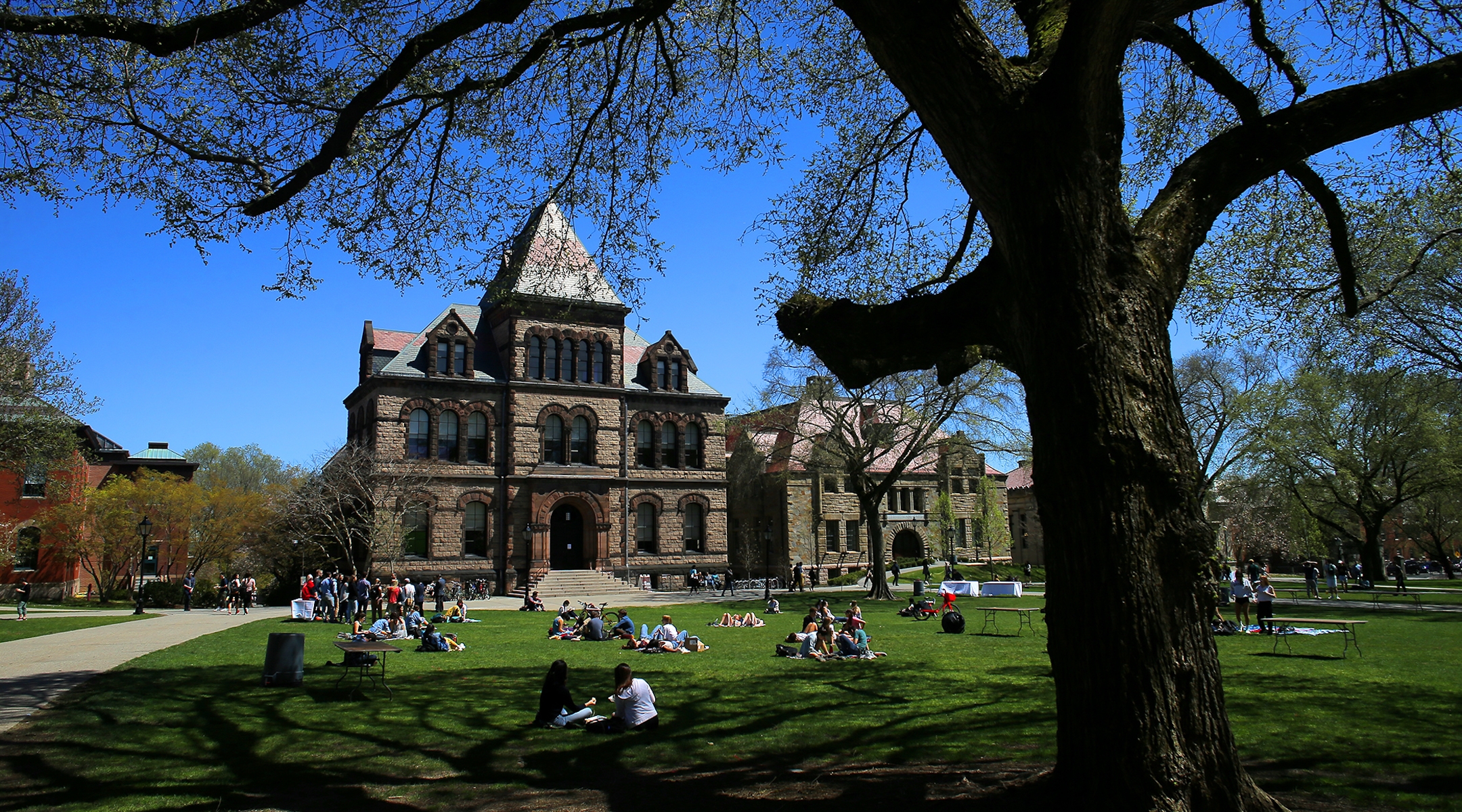Dozens of rabbis and cantors who graduated from Brown University have a message for their alma mater’s president: “Do not cede control to those who weaponize antisemitism.”
Their message comes in an open letter to President Christina Paxson as she weighs how to respond to a $500 million funding cut threatened by the Trump administration, ostensibly over Brown’s handling of antisemitism on campus.
Brown is one of a growing number of universities, many of them in the Ivy League, to be threatened with similar cuts by the Trump administration. As the list expands, and as the Trump administration moves to retaliate against Harvard for resisting its pressure, Jewish students, alumni and groups are openly rejecting moves that the White House says are meant to protect them.
In the past week, a chorus of dissent has come from Jewish community members at Harvard, Emerson College, Georgetown University and more.
At Harvard, over 100 Jewish students signed a letter decrying the Trump administration’s announcement earlier this month that it would review $9 billion in federal funding to the school. The letter was written before the administration froze $2.2 billion in funding this week and was rebuked by Harvard’s president.
“We are compelled to speak out because these actions are being taken in the name of protecting us — Harvard Jewish students — from antisemitism,” the students wrote, according to The Harvard Crimson. “But this crackdown will not protect us. On the contrary, we know that funding cuts will harm the campus community we are part of and care about deeply.”
Harvard Hillel said in a statement on Friday that the Trump administration’s actions are harming Jews on its campus.
“The current, escalating federal assault against Harvard — shuttering apolitical, life-saving research; targeting the university’s tax-exempt status; and threatening all student visas, including those of Israeli students who are proud veterans of the Israel Defense Forces and forceful advocates for Israel on campus — is neither focused nor measured, and stands to substantially harm the very Jewish students and scholars it purports to protect,” the statement said.
More than a dozen Jewish faculty members at Emerson signed a letter published in the Berkeley Beacon Wednesday that expressed concern over the “weaponization of antisemitism” to further the Trump administration’s agenda.
“This is a transparent move by the Trump administration to concentrate power and erode university independence under the offensive pretext of ‘protect[ing] Jewish students,’” the letter read.
At Georgetown, over 170 Jewish students, faculty, staff and alumni signed a letter condemning the detainment of Georgetown researcher Badar Khan Suri last month. His detainment was a part of a string of arrests of pro-Palestinian activists on campuses by the Trump administration to curtail campus antisemitism.
Dozens of Jewish groups recently joined an amicus brief in support of a Tufts University student who was detained over an op-ed she wrote in a student newspaper criticizing Israel.
The criticism is coming from Israel, too. On Thursday, over 170 Israeli academics also denounced the Trump administration’s detainments in an open letter, writing that “such draconian moves do not protect us” and lambasting the “cynical use of ‘combating antisemitism’” as an impetus for the administration’s actions.
And it’s not just people affiliated with universities who are pushing back on the Trump administration’s campaign against higher education under the guise of fighting antisemitism.
Ten major Jewish organizations comprising leaders in the Reform, Conservative and Reconstructionist movements made a joint statement Tuesday rejecting what they called the “false choice” between Jewish safety on campuses and democracy.
“We reject any policies or actions that foment or take advantage of antisemitism and pit communities against one another; and we unequivocally condemn the exploitation of our community’s real concerns about antisemitism to undermine democratic norms and rights, including the rule of law, the right of due process, and/or the freedoms of speech, press, and peaceful protest,” the statement read.
The Trump administration’s higher education moves have Jewish supporters, particularly when it comes to canceling the visas of students who have engaged in anti-Israel activism. Multiple activist groups have taken on the task of identifying students and reporting on them to the White House. The funding pressure has Jewish defenders, too.
But there are increasing signs that the funding cuts — billions of dollars are so far on the line — may have overshot the ambitions of even the most demanding critics of antisemitism on college campuses.
On Friday morning, the Anti-Defamation League’s CEO, Jonathan Greenblatt, sharpened earlier criticism of the Trump administration’s higher education agenda. While saying that Harvard and other schools have real challenges when it comes to antisemitism, he said they were more likely to improve with support than with steep punishments and that penalties, if applied in rare instances, should be narrowly targeted.
“The fight against antisemitism must be about antisemitism — nothing more, nothing less,” Greenblatt said in a statement.
“Resolving the very real crisis of antisemitism should not jeopardize the entire enterprise of our system of higher education,” he added. “We should be able to hold institutions accountable for protecting Jewish students, faculty, and staff while maintaining a commitment to academic freedom and independent inquiry. Again, nothing more, nothing less.”
JTA has documented Jewish history in real-time for over a century. Keep our journalism strong by joining us in supporting independent, award-winning reporting.





